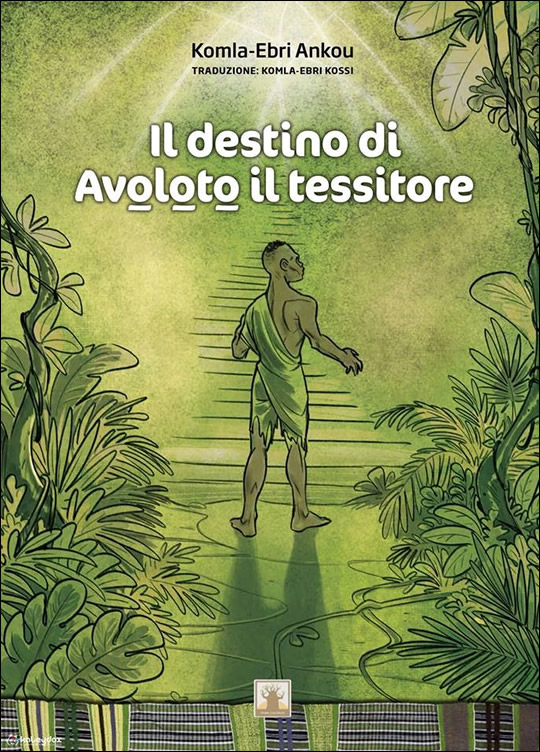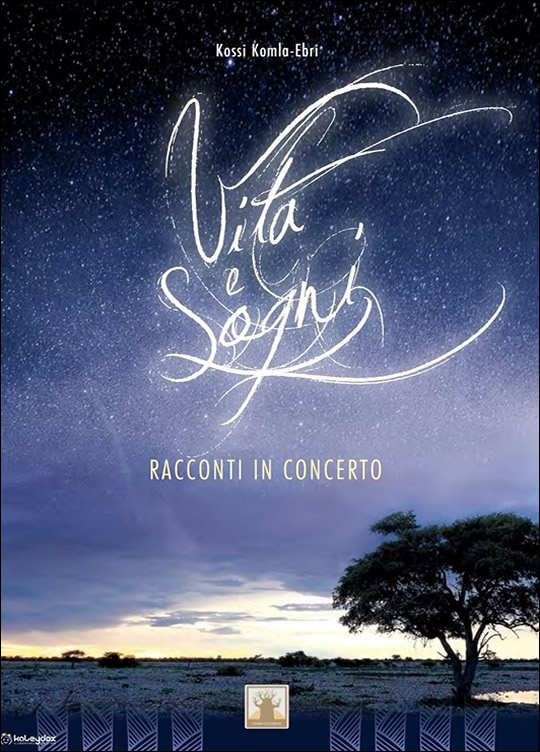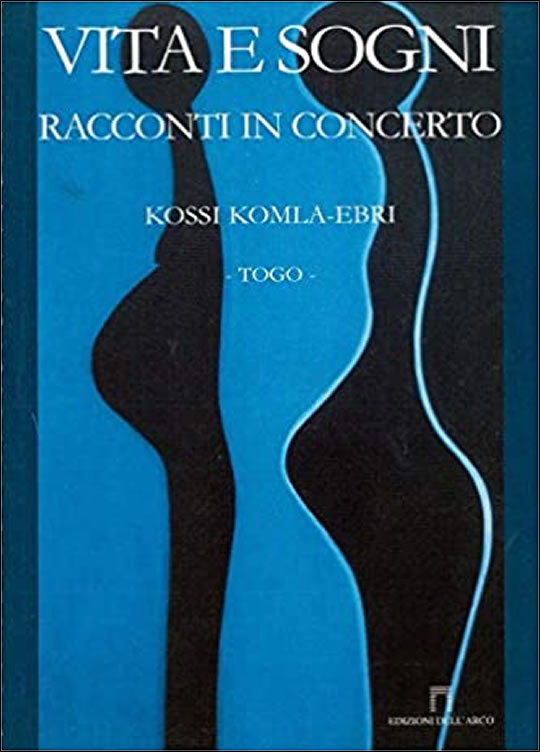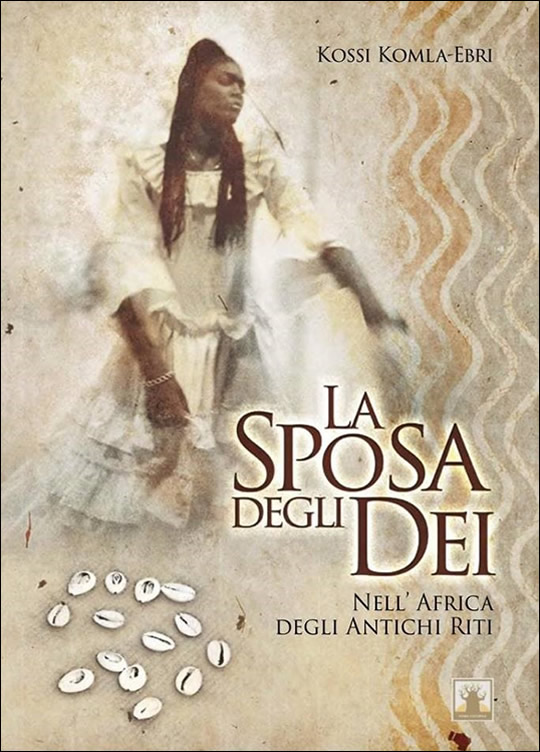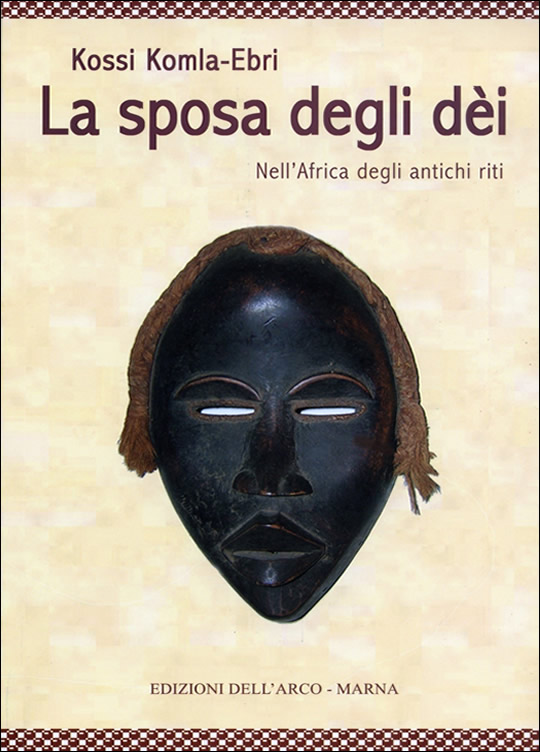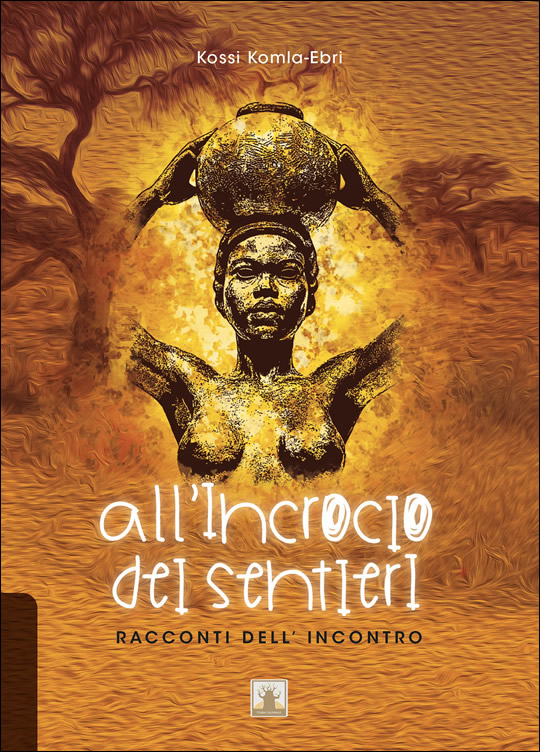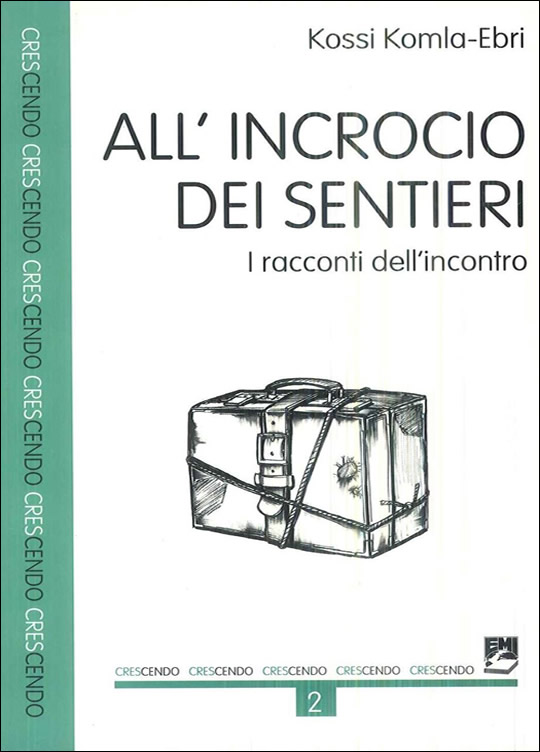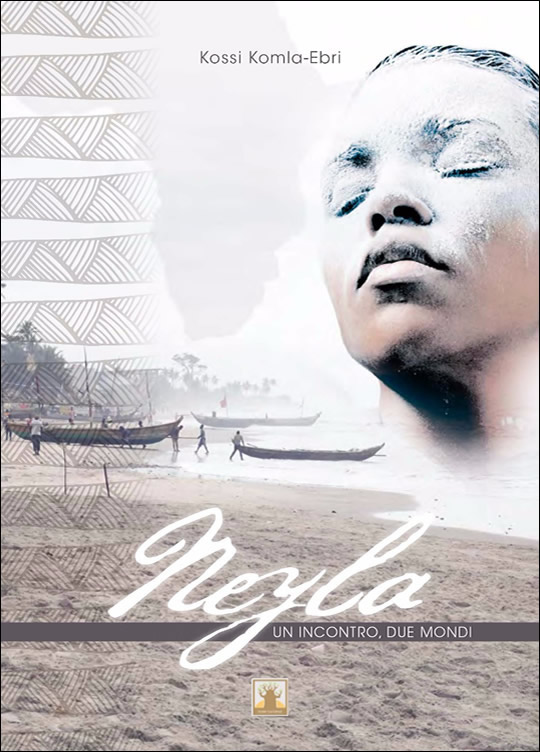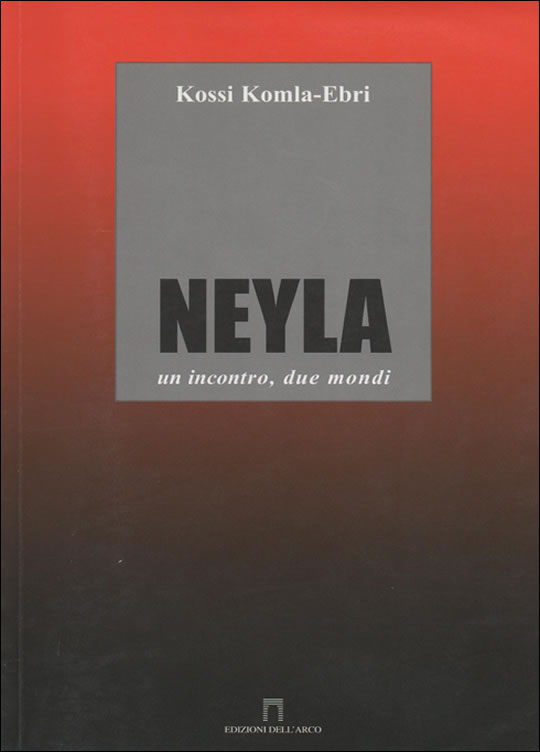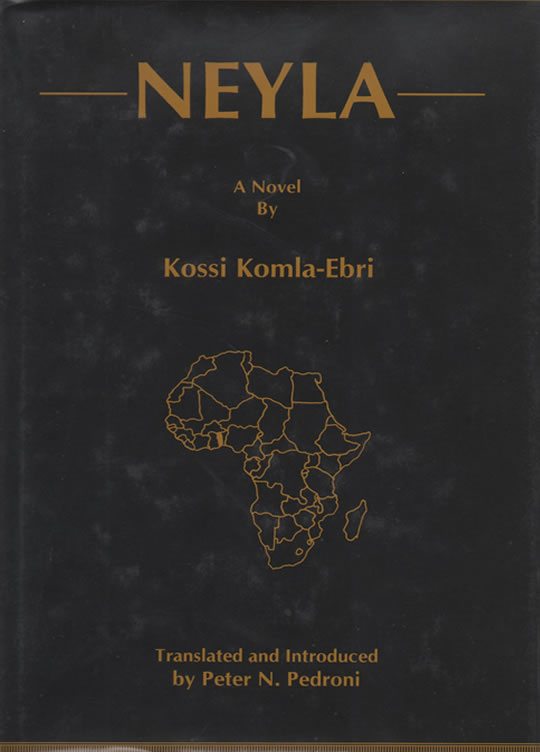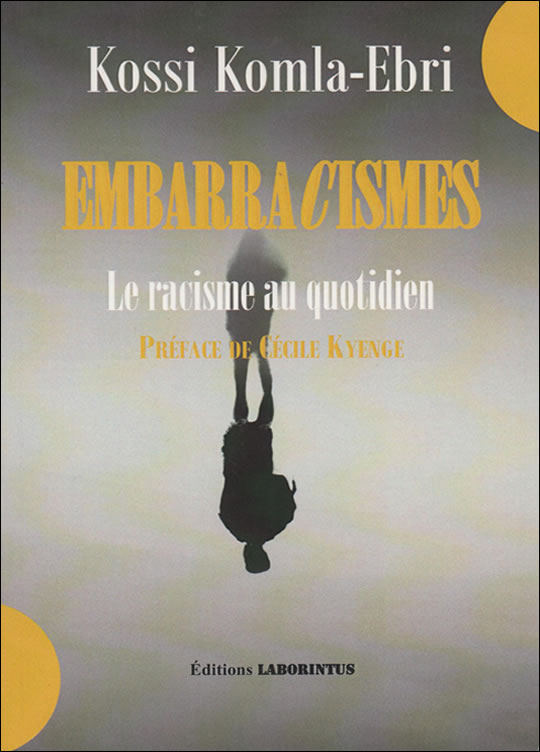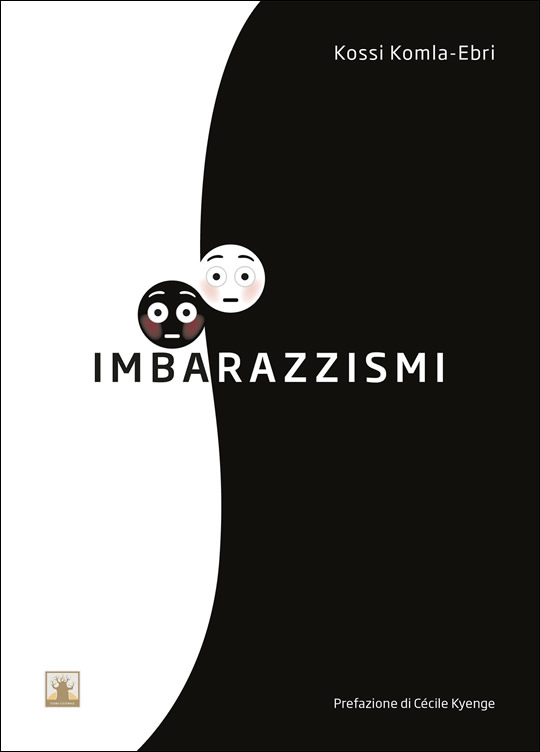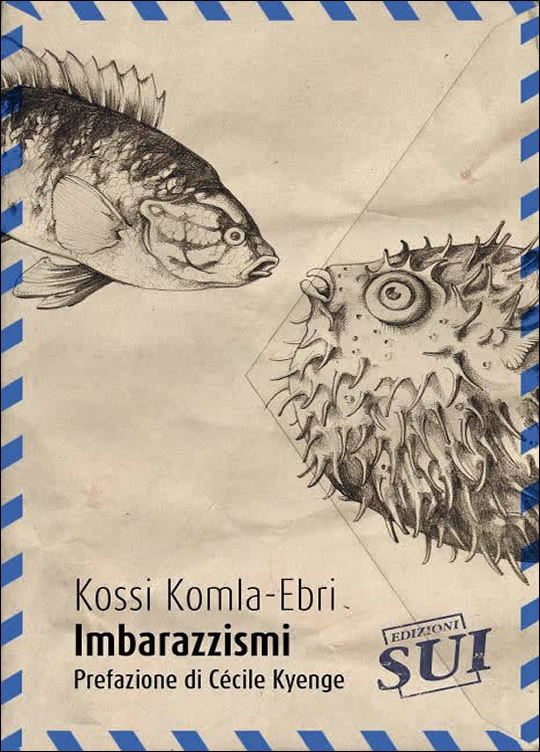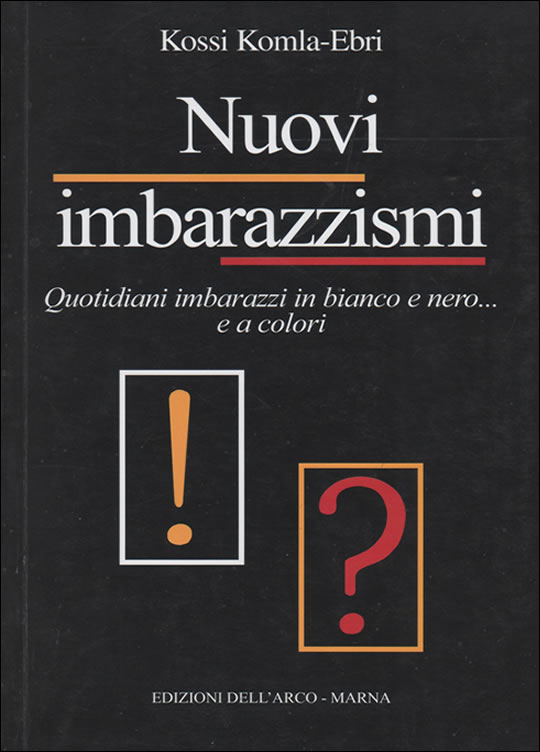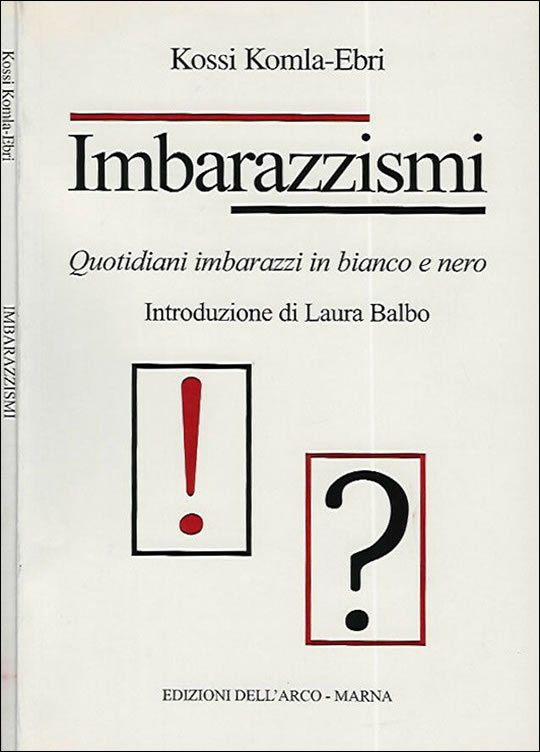Neyla
Neyla
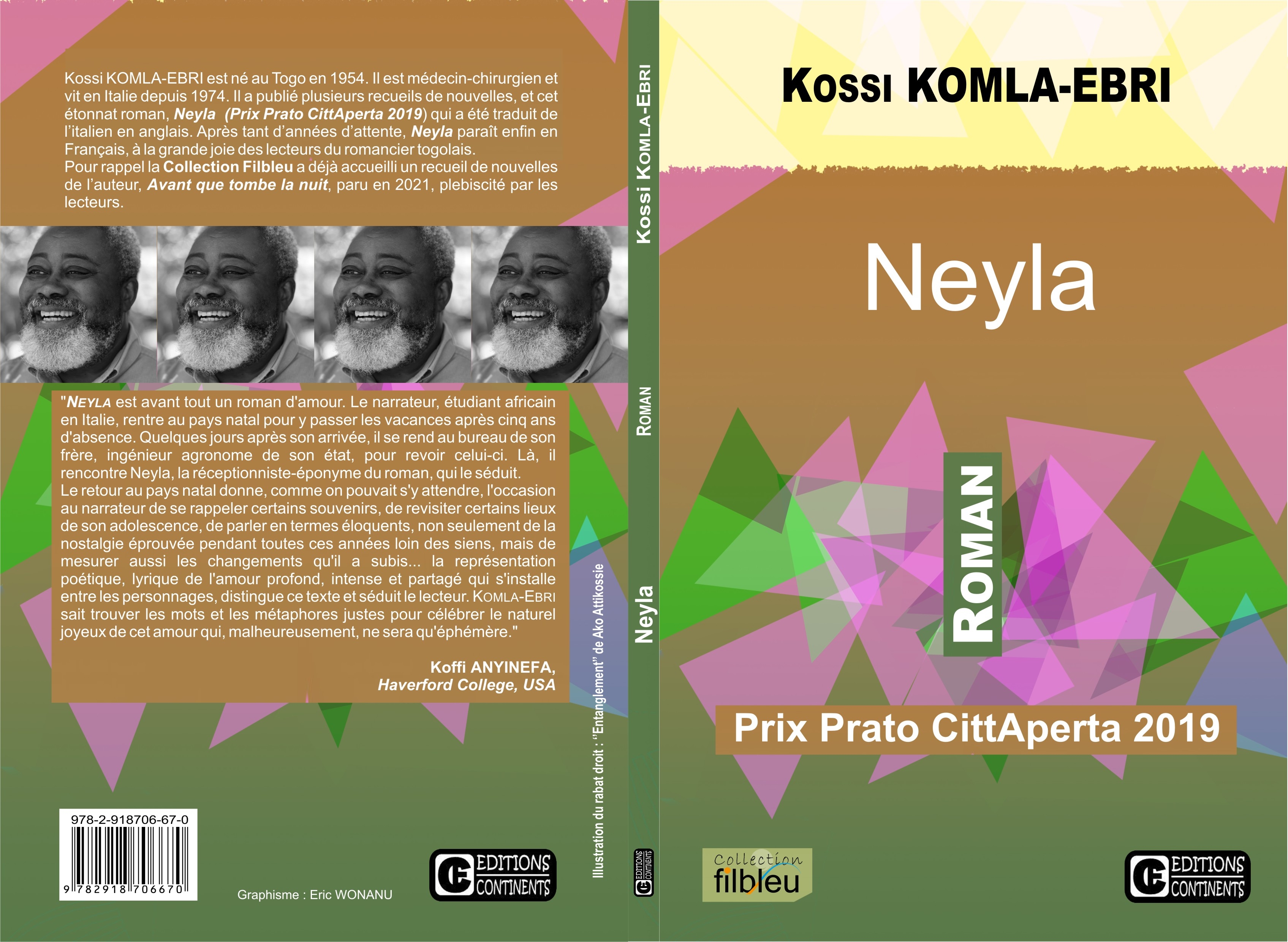
Kossi KOMLA-EBRI
Roman
Prix Prato CittAperta 2019
Neyla
Koffi Anyinefa
Haverford College USA
HOME
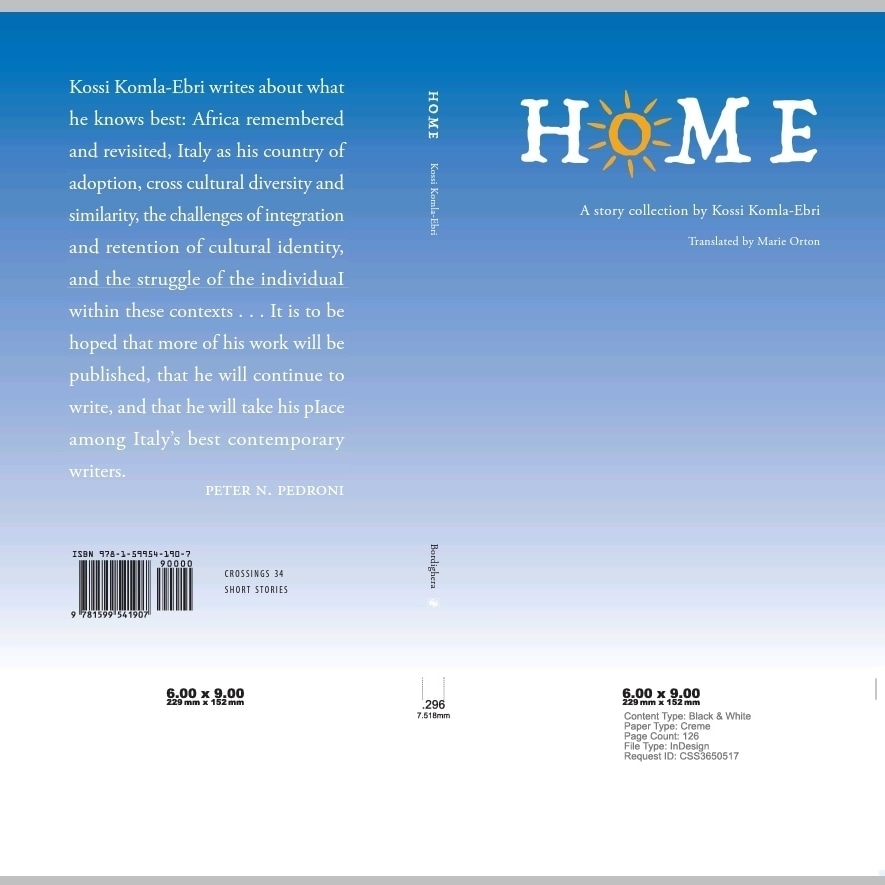
HOME- A story collection by Kossi Komla-Ebri
HOME- A story collection by Kossi Komla-Ebri Translated by Marie Orton
Excerpt “When I’ll cross the river”
It is true that “a man never returns to his mother’s womb, but he gladly returns to his native village.”
I remember when I was a young student in Europe returning home one summer to my village Hanyigba in Togo, that village of ours gripping the mountains.
***
Before saying good-night with his usual, “I’m going to bed, may God wake us up” that night my father said:
“Tomorrow morning we must wake up early; we have a judgment in the Ablomé neighborhood.”;
Seeing my questioning look, he continued: “Yes, I know you are not yet old enough to sit with us, but the elders have decided that your level of study, and the fact that you have traveled, gives you the right to sit under the tree of palabre. 1 Go rest; tomorrow you will be with us in Ablomé.”
***
I spent the night brooding over a thousand thoughts: how I should behave, if I’d have the patience to deal with the numerous codified rituals of the palabre, especially since I by now I had become accustomed to summarizing when I spoke, getting straight to the heart of the matter.
***
We arrived in Ablomé in the courtyard of old Nukuku. “Nukuku” in my language means “dead thing,” and in Europe one would immediately react, “What an ugly name!” but actually It’s a name for good luck, because her parents had lost all their children in infancy that were born before her. When she was born, her mother named her “Nukuku” to keep her alive because by calling her “Dead Thing”, her mother was sure that death would not take the baby away. What would Death do with a dead thing? Indeed, Death spared Dead Thing until she became a grumpy old woman with a face furrowed by the snares of life.
Strength and power of the Word, the power of the Name. The Word can therefore defeat death....
The courtyard of the elderly Nukuku’s was already crowded with people and a chorus of “Welcome, you who have walked!” greeted us as we crossed the threshold. We sat under the thatched roof in the courtyard with the elders and notables of the village in a semicircle facing Nukuku’s house.
***
(…) the dignitary Yawovi took up the word again, addressing the elder Wadefe:
“I beg Papa Wadefe to hear with his mind and heart these words of mine, and to convey them to our leader in such a way that they may reach the hearts and minds of all present here. Everyone present here knows that we are together in the elderly Nukuku’s courtyard. My cousin Nukuku, as you all know, is seriously ill and has been bedridden for a fortnight in one of the huts here in front of us: her hours are now numbered and she is preparing to take the path that leads to the great river...” (It is a belief among us that life and death are on opposite sides of the same river, and to die is nothing more than to cross the river).
“Yesterday” resumed Yawovi, “her daughter Abra, who has been living in the city for years now, came seeking our help. Years ago, after a furious argument with her mother, before Abra left home forever, her mother told her these exact words: “Do what you will, my daughter, but as sure as my name is Nukuku, when I cross the river.... you will cross the river with me.”
At such grave words, a chill shook the whole assembly into an icy silence. Then Yawovi continued explaining that, with his mother now on the path to the river, Abra had begun to feel sick in the city, to feel a burning inside her every day, sometimes in her belly, then in her legs, then in her hips. All over her body, she felt like ants were running under her skin or an electric current was running under her hair. The white doctors in town didn’t understand and gave her drops that only made her sleep.
Finally, Abra, exhausted, had gone to consult a soothsayer who had told her while looking at the shells, “Sometimes it is difficult to separate the fingernail from the finger, the pestle from the mortar... go back to your village and you will understand...”
Abra returned to find her mother in agony, to remember her mother’s dreadful statement, “When I cross the river.... you will cross the river with me” to understand the strength and power of the Word. The Word that can defeat death.
Can the Word that defeats death also bring death?
1 “Palabre” means “discussion.”
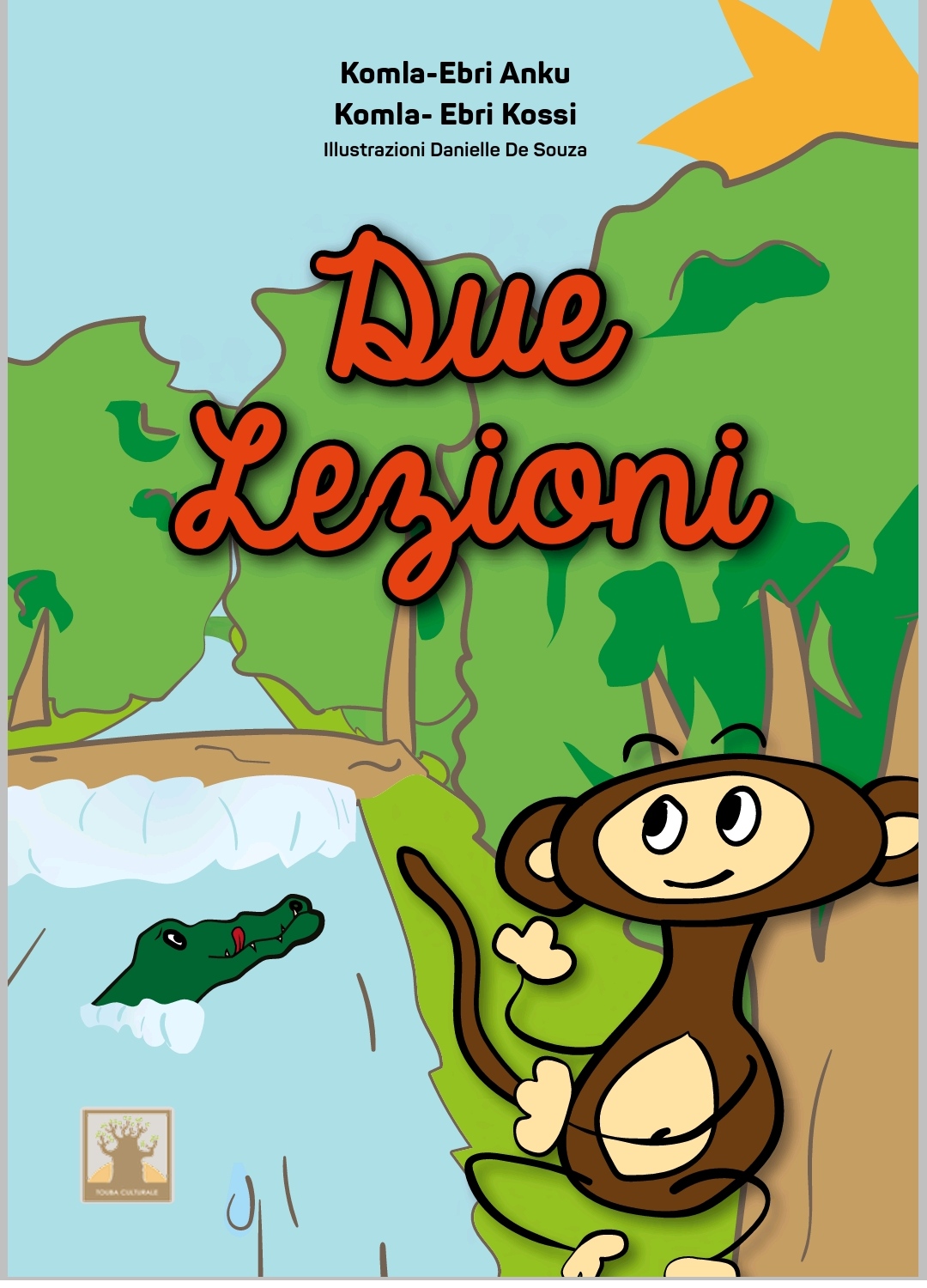
Due lezioni
(Komla-Ebri Anku / Komla- Ebri Kossi)
Due lezioni (Komla-Ebri Anku / Komla- Ebri Kossi) Illustrazioni: Danielle De Souza Impaginazione Grafica: Alessandra Carcano
“Gente, udite la mia favola!”
“Ben venga la tua favola.”
La mia favola, parte sul filo del tempo, corre, corre e…cade su Késsé- la – scimmia e Alen- il- montone:
Quelli erano i tempi in cui gli animali andavano d’amore e d’accordo e non si facevano la guerra: tutti vivevano in pace. Ogni tanto vi era qualche scaramuccia: succedeva così al leone di stuzzicare un po’ troppo una gazzella o un’antilope tanto da lasciarle delle unghiate, ma non era niente di grave, era solo per scherzare, per passatempo…A volte lo sparviero condiscendeva a scendere dalle sue alture e piombava addosso a qualche uccellino, ma niente d’allarmante; era solo un gioco. La mangusta pettegolava con i sibilanti serpenti e il tapiro si concedeva il piacere di trasportare le formiche sulla sua lingua. Certo accadeva che, per distrazione, egli chiudesse la bocca su di loro, ma in fondo era solo uno spiacevole incidente senza grande importanza.
Insomma a quei tempi gli animali vivevano in pace e s’intendevano a meraviglia.
Un giorno Késsé- la- scimmia venne a trovare Alen -il- montone:
“Alen amico mio” – annunciò- “vorrei andare a rendere visita ad alcuni parenti dall’altra parte del fiume, ma come sai, il cammino è più breve quando si viaggia in compagnia. Mi piacerebbe che tu mi accompagnassi, saremo di ritorno fra due giorni.”
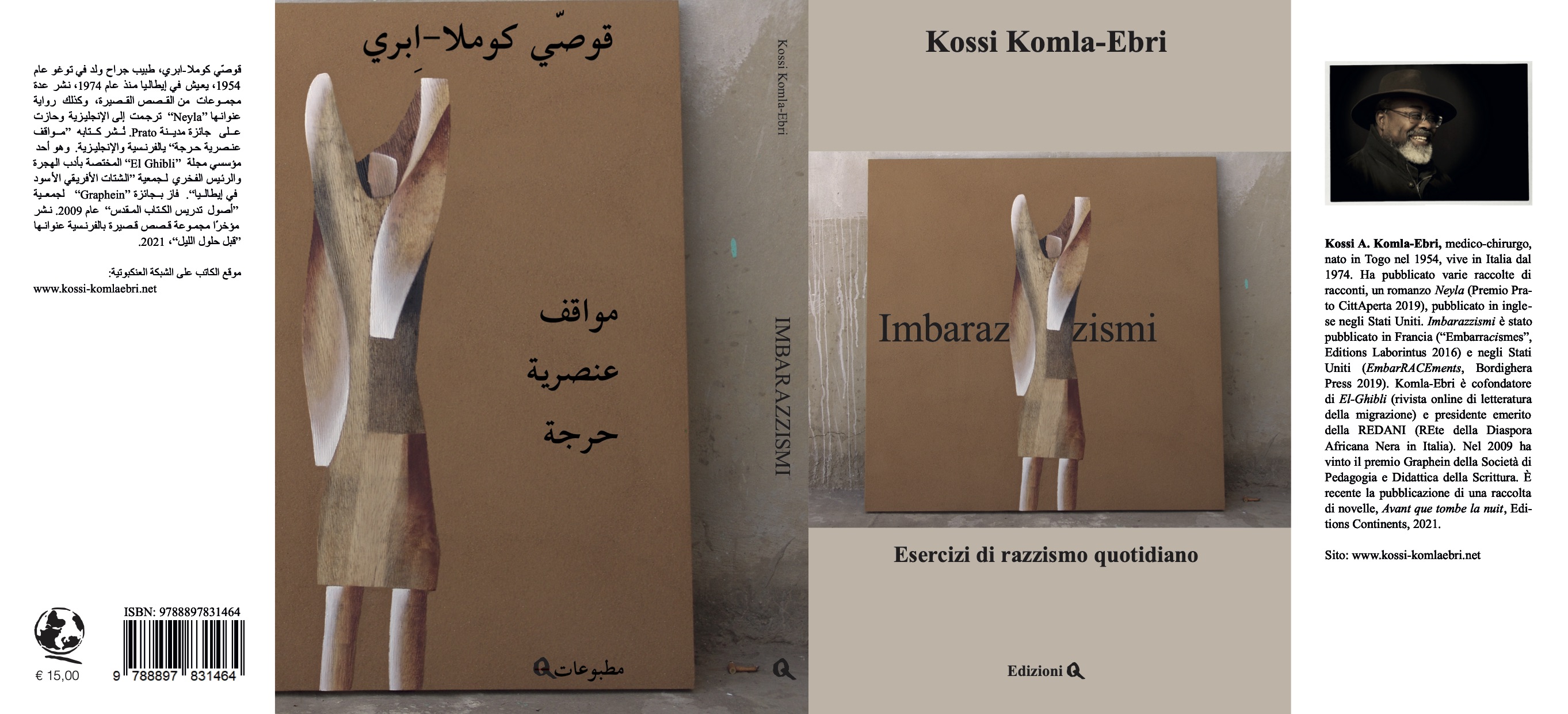
Imbarazzismi. Esercizi di razzismo quotidiano (libro bi-fronte italiano-arabo),
Imbarazzismi. Esercizi di razzismo quotidiano مواقف عنصریة حرجة (libro bi-fronte italiano-arabo)
كوملا-اِبري
مواقف
عنصریة
حرجة
مطبوعات Q
قوصّي كوملا-اِبري
سیسیل كیینجھ
وزیرة الاندماج الاجتماعي سابقاً*
مقدمة
كل أسود يعيش في إيطاليا لديه ذخيرة غنية من "الحرج العنصري". فهذه التسمية الجديدة الموفّقة، التي ابتكرها كوصّي كوملا-إيبري، تشير إلى مواقف لا تدخل في حيّز حالات التمييز الفظّة، العنيفة أو على الأقل المتعمّدة، لكن الأمر يتعلق بحوادث عنصرية من العيار الخفيف دون أن يدرك مسبّبها المعنى الضيّق للكلمة.
"الحرج العنصري"، كَزَلّة لسان غير مؤاتية، يثير الإنزعاج. وأسوة بالهفوة الفرويدية[1]، فإنها تكشف الأحكام والأحكام المسبقة المُسْتأصَلة.
ولكن على الرغم من أن كل حادثة من هذه الحوادث ليست ذات شأن، فإن "الحرج العنصري" يلحق الأذى بمشاعر ضحاياه، لأنه يتكرر يومياً ويكشف عن ذهنية شائعة آهلة بالقوالب النمطية.
كيف يمكن التغلب على الأحكام المسبقة؟ الخطوة الأولى في التغلب على الأحكام المسبقة هي معرفة كيفية استشفافها. يجب أن نعترف بأن كل واحد منا لديه أحكام مسبقة عديدة، لذلك يجب أن نتعلم أن نراها ثم نكون على استعداد لإعادة النظر بها، وتوسيع معرفتنا ومقارنتها مع واقع الحقائق.
هذه المجموعة من الحكايات المضحكة، اللاذعة والمبهرة، تساعدنا على كشف النقاب عن المركزية الإثنية والنمطية عن طريق السخرية، وهي سلاح لطيف ولكنه فعال ضد العنصرية الدفينة.
يذكّرنا كتاب الطبيب والكاتب الإيطالي-التوغولي بأنه لا يزال يتعين علينا قطع مسافة أخرى من الطريق لبناء مجتمع ومواطنة شاملة حقاً تجاه الأقليات والأشخاص من أصول مختلفة، ولكن ينبغي علينا أيضاً أن نلاحظ أن العقلية تتغيّر، وأنها قد تغيّرت بالفعل جزئياً.
يشهد المجتمع الإيطالي تحولاً سريعاً: من بين أبطال القصص القصيرة التي جمعها كوصّي كوملا- إيبري – بالإضافة إلى الأشخاص الذين ما زالوا في حيرة من أمر إيطاليا المهجّنة أكثر فأكثر- ثمة العديد من الأزواج المختلطين، والأسر بالتبني، ومجموعات الأصدقاء المكونة من أشخاص ينتمون لجنسيات مختلفة.
باختصار، هناك بلد يكون لون الجلد، أسوة بلون الشعر، في علاقات المودة والعلاقات الاجتماعية، مسألة ميلانين فحسب. بلد حيث الاختلافات بين كل عضو هي قوى كامنة يجب أن نعمل منها كنزاً.
سيسيل كيينجه[2]
وزيرة الاندماج الاجتماعي
[1] يمكن تعريف الهفوة الفرويدية على أنها نوع من الأخطاء غير الطوعية الناجمة عن صراع نفسي موجود في الفرد. هذه الأخطاء وأوجه القصور، التي يعتبرها معظم الناس مرادفة لقلّة الاهتمام، تأخذ مغزى مختلفًا تمامًا وفقًا للتحليل النفسي الذي يعتبرها أي شيء سوى العشوائية، ولكنها تُعزى، بدلاً من ذلك، إلى وجود تباينات داخلية للفرد بين إرادته الواعية و ميوله اللاواعية.
[2] كاشيتو كيينجه، المعروفة باسم سيسيل (من مواليد كامبوفه، 28 أغسطس 1964)، هي سياسية إيطالية من جمهورية الكونغو الديمقراطية. شغلت منصب وزيرة الاندماج الاجتماعي من 28 أبريل 2013 إلى 22 فبراير 2014 في حكومة إنريكو ليتّا، أول وزيرة "سوداء" (كما تفضل أن تعرّف نفسها، بدلاً من وزيرة "ملونة") في حكومة إيطالية.
بسبب قناعاتها السياسية بشأن الهجرة، قوبل تعيينها في منصب وزيرة معارضة شديدة من قبل مختلف أعضاء حزب رابطة الشمال اليميني المتطرف. وكان الأصل الكونغولي هو نقطة ارتكاز الهجمات التي شنها عليها عضوا البرلمان إرمينيو بوسو وماريو بورغيزيو من الحزب المذكور. وسجلت الصحافة في الأيام التالية العديد من الهجمات العنصرية الأخرى من رابطة الشمال والجماعات السياسية الأخرى، وردّت الوزيرة إنها ستتبع مبدأ اللاعنف ولن ترد على الاستفزازات.
في 13 يوليو 2013، وجه نائب رئيس مجلس الشيوخ روبرتو كالديرولي، خلال مظاهرة لرابطة الشمال، بعض الإهانات من المنصة ضد الوزيرة، واصفا إياها بـ "أورانغ أوتان أو إنسان الغاب". أدانت معظم الشخصيات السياسية الإيطالية هذه الحادثة، من رئيس الجمهورية إلى رئيس الوزراء، ومن رئيسي مجلس الشيوخ ومجلس النواب، ومن الأمم المتحدة والفاتيكان. كما حظيت هذه الحادثة بتغطية إعلامية كبيرة في الصحافة الأجنبية.
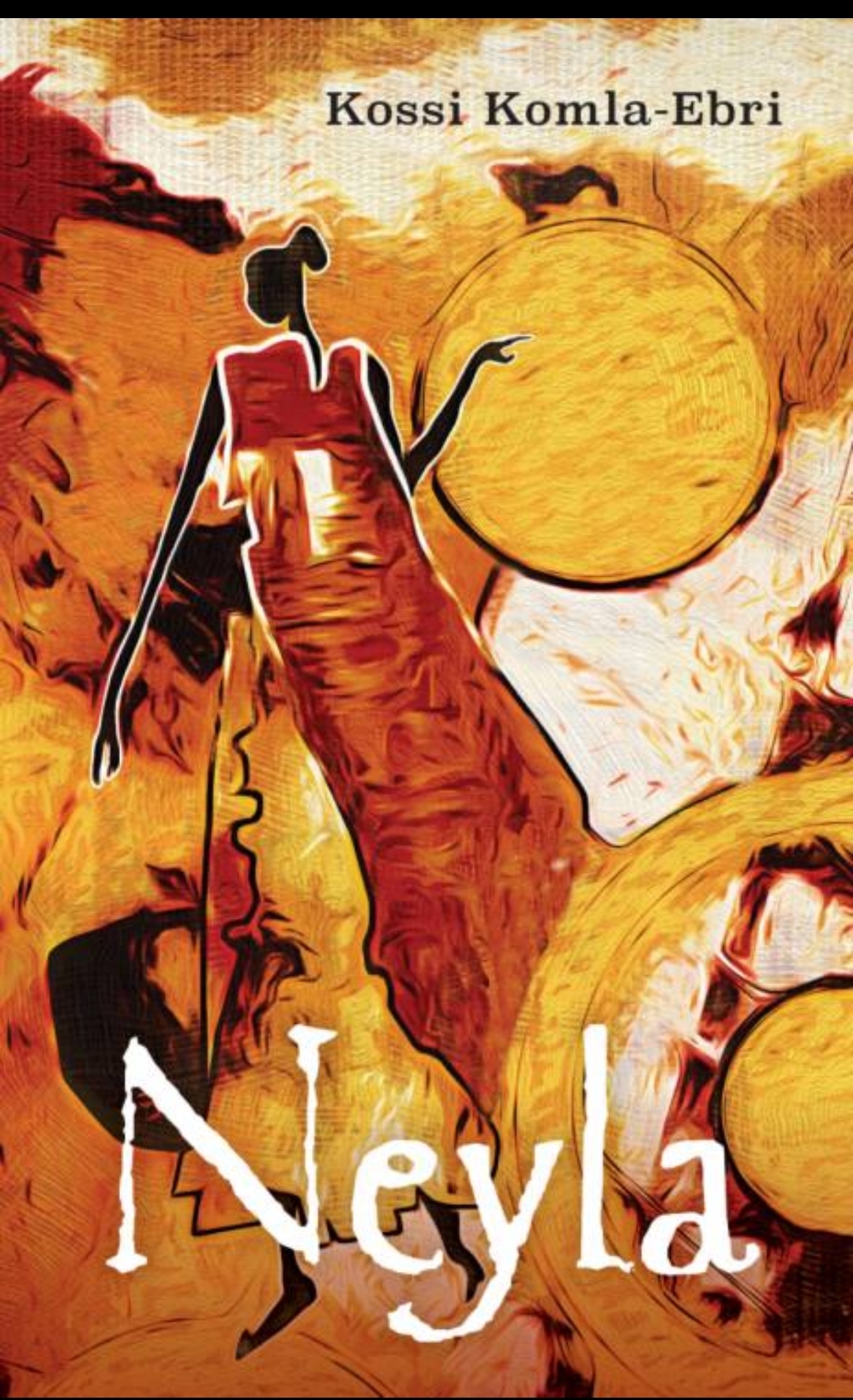
Neyla (v slovenščini)
Neyla
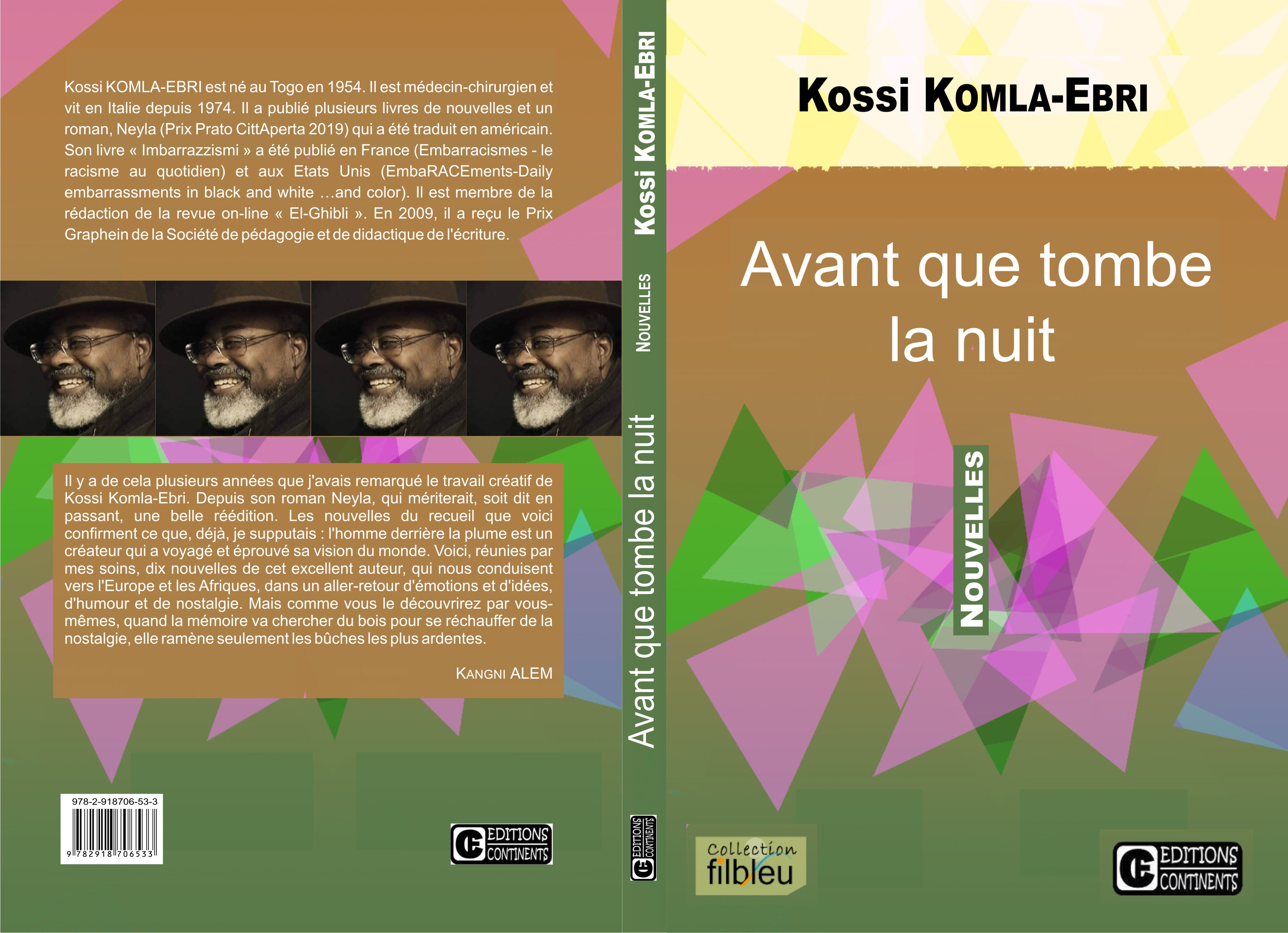
Avant que tombe la nuit (Prima della notte)
Avant que tombe la nuit (Prima della notte)
Diversi anni fa ho notato il lavoro creativo di Kossi Komla-Ebri. Fin dal suo romanzo Neyla, che, tra l'altro, meriterebbe una bella ristampa.
I racconti di questa raccolta confermano ciò che già supponevo: l'uomo dietro la penna è un creatore che ha viaggiato e definito la sua visione del mondo.
Ecco, raccolti da me, dieci racconti di questo eccellente autore, che ci portano l’ Europa e le Afriche, in un viaggio circolare di emozioni e idee, umorismo e nostalgia.
Ma come scoprirete voi stessi, quando la memoria va a cercare la legna per scaldarsi dalla nostalgia, riporta solo i ceppi più ardenti.
Kangni ALEM
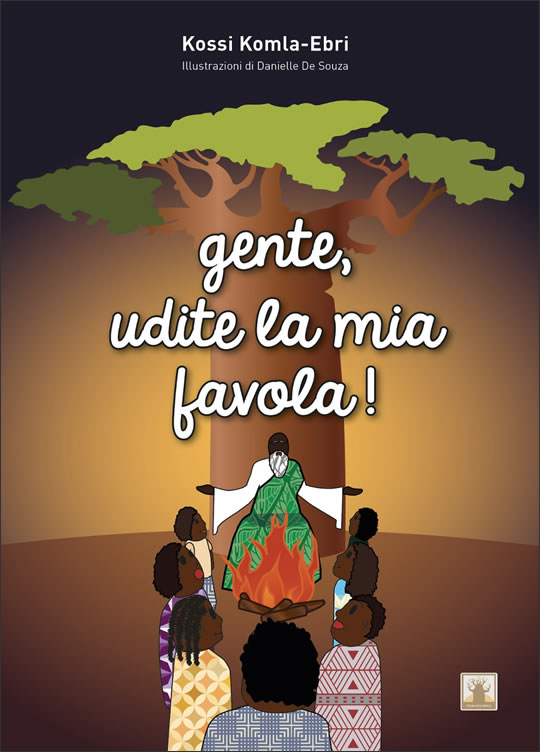
Gente udite la mia favola
Vedano al Lambro, Touba Culturale Italy 2020
Illustrazioni di Danielle De Souza
“Un racconto o un proverbio è il messaggio di ieri trasmesso a domani attraverso oggi”
(Amadou Hampaté Bâ)
Le favole iniziano sempre con una formula introduttiva “Gente udite la mia favola!”
che richiama l’attenzione dell’auditorio poi si elencano i personaggi principali.
Dicono da noi che le favole sono delle verità con delle menzogne (mettendo in scena degli animali-eroi) che si raccontano nel buio, di notte per ingannare, perché nessuno è stato vero testimone dei fatti raccontati. Perciò bisogna finire sempre con la formula:
“Ehi gente! È così che mi hanno imbrogliato e sono venuto ad ingannare anche voi!”
Che è anche un invito a conservare preziosamente il racconto con la speranza di poter “ingannare” un giorno altre persone.
“Il destino di Avoloto il tessitore” di Ankou Komla-Ebri
Vedano al Lambro, Touba Culturale Italy 2019
Traduzione di Kossi A.Komla-Ebri
“Ognuno nasce col proprio destino, ma questo destino non è fatale, fossilizzato, rigido.
Possiamo influenzarlo, cambiarlo: in una parola solo noi stessi siamo i protagonisti, gli artefici del nostro destino. Nessuno può modificare il nostro destino per noi.”
"Vita e sogni"-racconti in concerto
Vedano al Lambro, Edizione Touba Culturale Italy 2019
Questa nuova antologia di Kossi Komla-Ebri raccoglie testi diversi fra di loro per tema, protagonisti e modalità narrative. Sono però uniti da un filo di sogno, sospesi fra fantasia e realtà ...magistralmente dosate dall’autore in percentuale variabile pagina dopo pagina. Onirici e crudi, mentali e reali, fluttuanti e ancorati alla vita, in un concerto di voci, sussurri e grida, i racconti di Kossi lasciano al lettore il gusto di scoprire quando lasciarsi cullare dalle parole verso il loro mondo di sogno e quando invece è il momento di svegliarsi e farsi delle domande.
“La sposa degli dèi” (racconto lungo)
Vedano al Lambro, Touba Culturale Italy 2019
L’uso della parola positiva, non portatrice di menzogna, di contraddizioni interiori, è veicolo di equilibrio psicofisico. Quando il rapporto fra parola e verità si rompe, ne risente il corpo, ma anche la mente. Il corpo si ammala, la mente si offusca.
Quando la parola si allontana dalla verità dei fatti, la menzogna, perfino la stessa omissione della verità, coinvolge in una disfunzione corporale, che può condurre a conseguenze estreme, perfino alla morte.
“All’incrocio dei sentieri” Racconti dell’incontro
Vedano al Lambro, Edizione Touba Culturale Italy 2018
L’Altro, soprattutto il nero, con i suoi modi, suoni, cromie, riti ci mette in discussione a un livello di profondità radicale, ci riconsegna la terribile sensazione della nostra contingenza, ci rinvia alla possibile accidentalità di ciò che siamo, di ciò a cui teniamo, ci ricorda nel pieno della nostra vita, anche quando la fine è lontana, la nostra insuperabile finitezza di specie, collettiva, individuale. Gran parte delle nostre abilità intellettuali è destinata a soffocare questa sensazione, ad annullare il rischio che ci viene dalla percezione che altri punti di vista sul mondo sono possibili. Senza l’Altro, senza l’incontro (scontro) con gli “altri”, questo complesso risveglio, mobilitazione e sviluppo delle umane componenti (psichiche, razionali, relazionali) non avverrebbe (come talvolta purtroppo accade), o avverrebbe in misura assai limitata. In sintesi: l’altra via per scoprire il sé e, soprattutto, per costruire il sé. Difatti solo l’esistenza dell’alterità ci fa scoprire il bene reputato più personale e privato: la nostra stessa identità.
“Neyla” (romanzo)
Vedano al Lambro, Edizione Touba Culturale Italy 2018
Il tema di questo romanzo non è tanto l'amore, quanto ciò che questo sentimento vuole mascherare, ovvero i problemi vissuti da tutti coloro che hanno dovuto fare i conti col rimettere piede sulla propria terra. Kossi Komla-Ebri, il più lombardo tra i nuovi autori africani, ci fa riflettere e commuovere. Ci parla di partenze e di ritorni, di assimilazione e di identità culturale, ma lo fa rinunciando agli archetipi letterari dell'immigrazione, ad ogni nostalgico autobiografismo, per lasciare invece libero spazio alla creatività racchiusa nel bagaglio personale di tutti i migranti.
EmbarRACEments-Daily embarrassments in black and white …and color
EmbarRACEments New York, Bordighera Press 2019
Translated in english by Prof. Marie Orton and introduced by Prof. Graziella Parati. Endorsment Prof.John A. Powell
There is a noisy racism, that of insults, of hits, the one that kills. But there is also a silent racism, banal, sometimes unconscious, involuntary or that is meant to be funny but that can equally humiliate and discriminate.
Kossi Komla-Ebri exposes with bitter irony exasperating and disturbing episodes of everyday racism.
EmbarRACEments -Daily embarrassments in black and white ...and color
The theme is the embarrassment of the difference. The diversity - in particular that of the colour of the skin - which, in society, often leads migrants and natives to confront each other daily, in situations on the borderline between embarrassment and racism precisely those of the "EmbarRACEments".
In a world situation in crisis of sovereignty and nationalism, a series of questions remain unanswered and Kossi's book, besides making people smile, triggers a reflection on the concepts of belonging, integration, migration, identity.
“Embarracismes- le racisme au quotidien”
Lille, Editions Laborintus 2016
« Cet heureux néologisme, inventé par Kossi Komla-Ebri, dépeint les situations qui ne rentrent pas dans les cas de discrimination cruelle, violente ou du moins intentionnelle, mais sont des épisodes de racisme de petit calibre qui surviennent sans que leur auteur ne s’en rende vraiment compte. L’embarracisme, comme une gaffe indécente, crée un malaise. Comme un lapsus freudien, il dévoile des jugements et des préjugés refoulés. Si chacun de ces épisodes n’est pas grave en soi, les embarracismes blessent leurs victimes, parce qu’ils sont quotidiens et parce qu’ils illustrent une mentalité répandue peuplée de stéréotypes. »
Cécile Kyenge, Ancien ministre italien pour l’intégration, Députée européenne
“Imbarazzismi"
Vedano Al Lambro - Edizione Touba Culturale Italy 2018
Aneddoti divertenti, amari e folgoranti … Un arma gentile ma efficace contro il razzismo.
Questa edizione contiene i due volumi:
*"Imbarazzismi –Quotidiani imbarazzi in bianco e nero”
*“Nuovi imbarazzismi- Quotidiani imbarazzi in bianco e nero…e a colori”
“Nuovi imbarazzismi- Quotidiani imbarazzi in bianco e nero…e a colori"
Milano, Edizioni dell’Arco-Marna 2004
«Ho sempre pensato che ragionare su come il linguaggio complica, distorce e pesa sulle relazioni, costituisca un importantissimo aspetto della nostra società, che si vuole multietnica e multiculturale e forse multilinguistica: ecco l'uso dell'italiano che, chissà perché, si fa approssimativo e multiculturale quando ci rivolgiamo a chi non si riconosce come uno dei "nostri" (con la pelle scura cioè). Leggiamoli con attenzione, questi scritti, cerchiamo di imparare cose che sono davvero importanti per questo paese e per come vivrà (vivremo, noi e loro), nei prossimi anni. E un ultimo commento: apprezziamone il senso dell'umorismo, la "leggerezza"; noi, in genere, quando si tratta di queste cose, senso dell'umorismo e leggerezza, ne mostriamo poco.»
Laura Balbo, dalla prefazione del libro Imbarazzismi, 2002
"Imbarazzismi –Quotidiani imbarazzi in bianco e nero"
Con una introduzione di Laura Balbo- Milano, Edizioni dell’Arco-Marna 2002
Dal treno al supermarket, dall'ospedale alle strade della città, situazioni di quotidiano imbarazzo dipinte con pennellate dal tocco leggero. Più umorismo che razzismo: un imbarazzo spesso legato ad un modo troppo convenzionale di pensare e di vedere gli altri, piuttosto che ad un reale disagio nei confronti del "diverso". È un libretto che si legge in una ventina di minuti: una riproposta d’aneddoti già comparsi nell’antologia “La lingua strappata”* con l’aggiunta di nuovi episodi. Il tema è quello dell’“imbarazzo della differenza”. Diversità - in particolare quella del colore della pelle - che in una società non avvezza ad essa porta spesso migranti e nativi ad affrontarsi nella vita di tutti i giorni, in situazioni al confine fra l’imbarazzo e il razzismo. Appunto d’“imbarazzismi”. Ho scelto di raccontarle con una certa disincantata ironia, per fare sorridere più che ridere aiutando una meditazione sulle nostre relazioni di nativi/migranti piene d’atteggiamenti inconsapevoli rivelatori della spessa corteccia di fraintendimenti e di preconcetti che li avvolge.
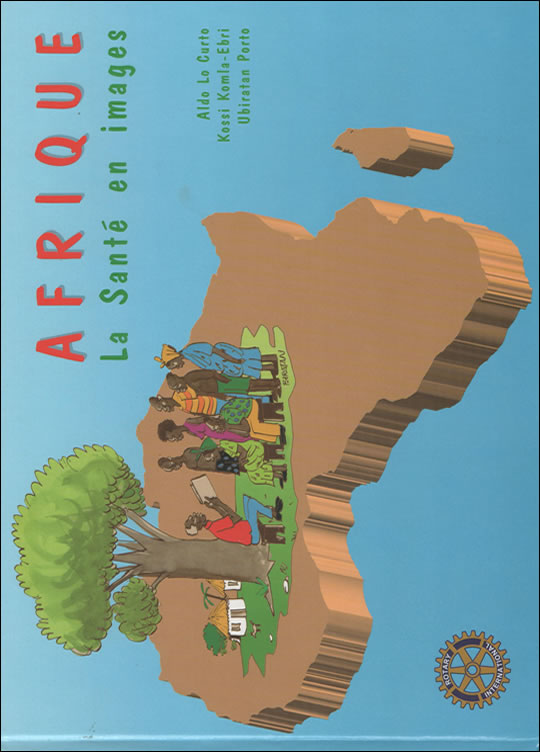
“Afrique. La santé en images”
Insieme al medico-itinerante Aldo Lo Curto e al disegnatore brasiliano Ubiratan Porto, egli è autore di “Afrique. La santé en images”, Rotary Club Lugano Lago e Fondazione Rotary 1998
Manuale (disponibile anche in versione inglese: “Africa Illustred Health Book”) pubblicato col contributo del Rotary Club di Lugano Lago e della Fondazione Rotary, viene distribuito gratuitamente in diversi villaggi africani per la divulgazione dell’educazione sanitaria tra le popolazioni locali. Per questa opera egli riceve la nomina a Paul Harris Fellow.


